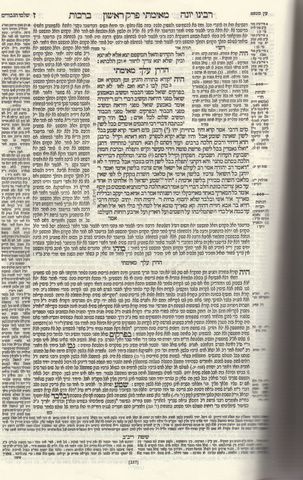
HIDE/SHOW IMAGE
7a
[we deduce that we do not hold like Rabbi Eleazar who says that if he says] haEl haKadosh and haEl haMishpat has fulfilled, but rather he has not fulfilled, and since he has not fulfilled he must go back, and so is the halacha.
End Perek.
Hadran Alach MeEimatay.
Perek II
MISHNAH.
IF ONE WAS READING IN THE TORAH [THE SECTION OF THE SHEMA'] WHEN THE TIME FOR ITS RECITAL ARRIVED, IF HE HAD THE INTENTION HE HAS PERFORMED HIS OBLIGATION.
IN THE BREAKS ONE MAY GIVE GREETING OUT OF RESPECT AND RETURN GREETING; IN THE MIDDLE [OF A SECTION] ONE MAY GIVE GREETING OUT OF FEAR AND RETURN IT. SO R. MEIR.
RABBI JUDAH SAYS: IN THE MIDDLE ONE MAY GIVE GREETING OUT OF FEAR AND RETURN IT OUT OF RESPECT, IN THE BREAKS ONE MAY GIVE GREETING OUT OF RESPECT AND RETURN GREETING TO ANYONE.
The Sages learnt {in a brayta}: The reading of Shema is as it is written {that is, in Hebrew}. These are the words of Rabbi. And the Sages {Chachamim} say: in any language.
What is the reason of Rabbi? Scripture states {in the Shema, in Dvarim 6:6}:
| ו וְהָיוּ הַדְּבָרִים הָאֵלֶּה, אֲשֶׁר אָנֹכִי מְצַוְּךָ הַיּוֹם--עַל-לְבָבֶךָ. | 6 And [they should be] these words, which I command thee this day, shall be upon thy heart; |
as they are {in Hebrew} so shall they be.
What is the reason of the Sages? Since Scripture states {2 psukim earlier}
| ד שְׁמַע, יִשְׂרָאֵל: ה אֱלֹקֵינוּ, ה אֶחָד. | 4 Hear, O Israel: the LORD our God, the LORD is one. |
-- in every language that you hear. But rather וְהָיוּ - And [they should be] - that you should not read it out of order, it is coming to teach.
And we establish {the halacha} like the Sages, firstly because an individual vs. the many, the halacha is like the many, and further that there is an anonymous statement in a Mishna like them, for we learn in a Mishna {the title Mishna of VeEilu Ne`emarin, the 7th perek of Sota - on daf 32a}:
And these are said in every language: the parasha of Sota, the confession of tithes, kriyat Shema, prayer {=Shemoneh Esrei}, grace after meals, the swearing of testimony, the swearing of the depositand it is established for us that in a case of a dispute between an anonymous statement in a Mishna vs. a dispute in a brayta, the halacha is like the anonymous Mishna. And this that we state {in that Mishna} that prayer can be in any language, this is only {when prayer} with the community, but when alone, no.
For {in Shabbat 12a} Rav Yehuda cited Rav: One should never ask for his needs in Aramaic.
And Rabbi Yochanan said: One who asks for his needs in Aramaic, the ministering angels do not heed him, for the ministering angels do not understand Aramaic.
The Sages learnt {in a brayta}: שְׁמַע, יִשְׂרָאֵל: ה אֱלֹקֵינוּ, ה אֶחָד -- Hear O' Israel, the LORD is our God, the LORD is one. Until this point you need the intent of the heart. These are the words of Rabbi Meir.
Rava said: The halacha is like Rabbi Meir.
They learnt {in a brayta}: Sumchos ben Yosef says: One who extends in {the word} `echad, his days and years are extended.
Rav Acha bar Yaakov said: And in the daled {of `echad} you should extend.
Rav Ashi said: Just so long as you do not make quick {the pronunciation of} the chet {in `echad}.
Rabbi Yirmiya was sitting before Rabbi Chiyya bar Abba who was extending {the pronunciation} extensively.
He {Rabbi Yirmiyah} said: Why do you do this so much?
He {Rabbi Chiyya bar Abba} said to him: And rather until how much?
He {Rabbi Yirmiyah} said: Until you king Him over heaven and earth, and the four corners of the world.



No comments:
Post a Comment